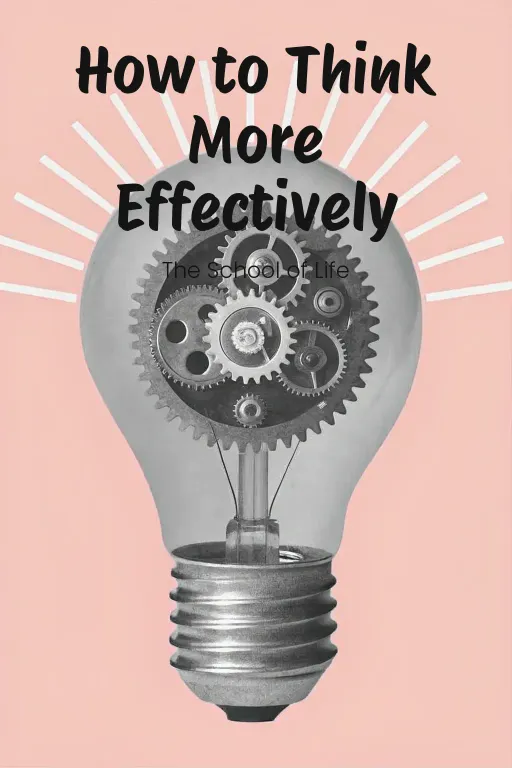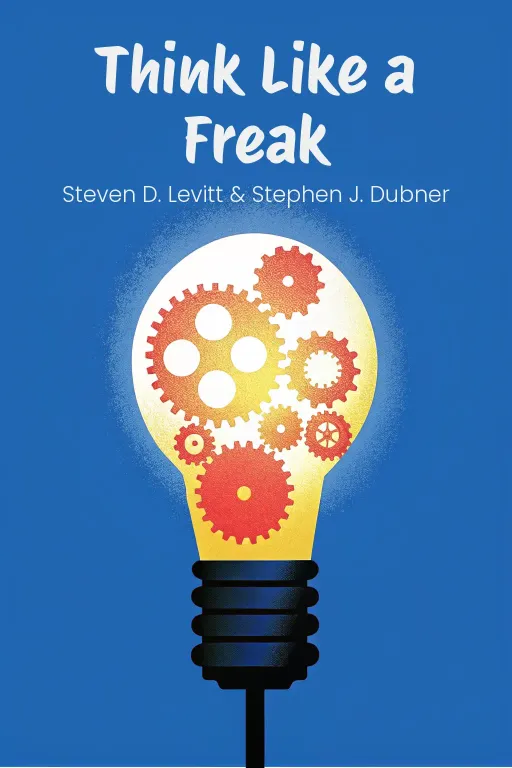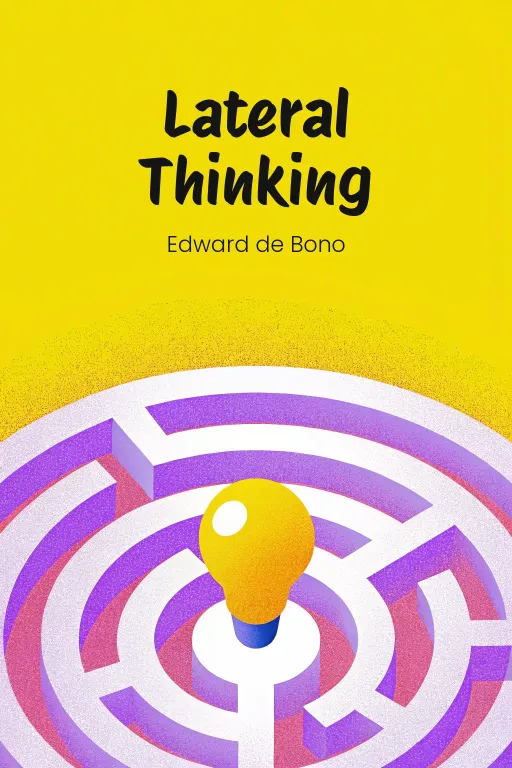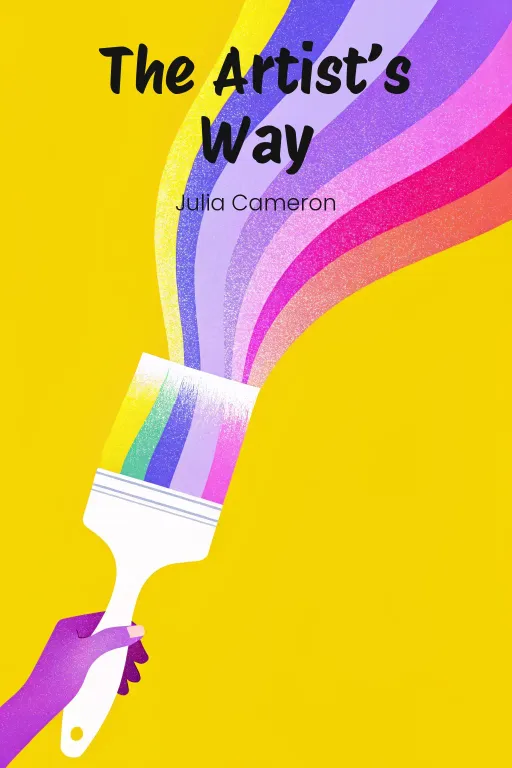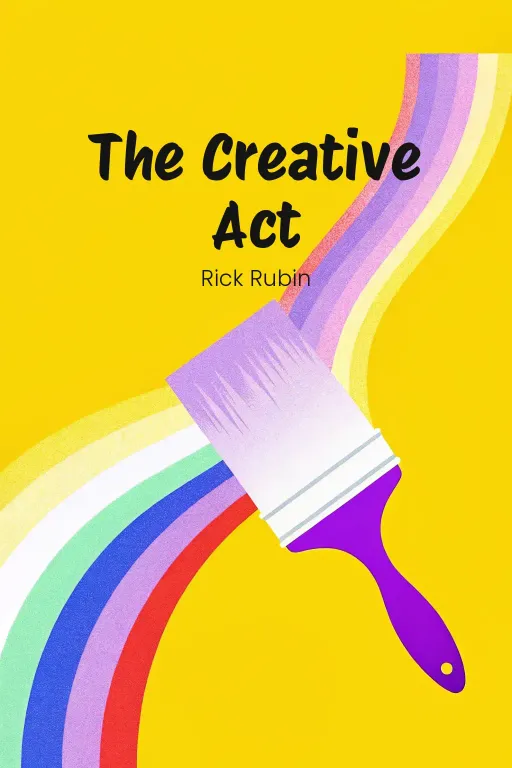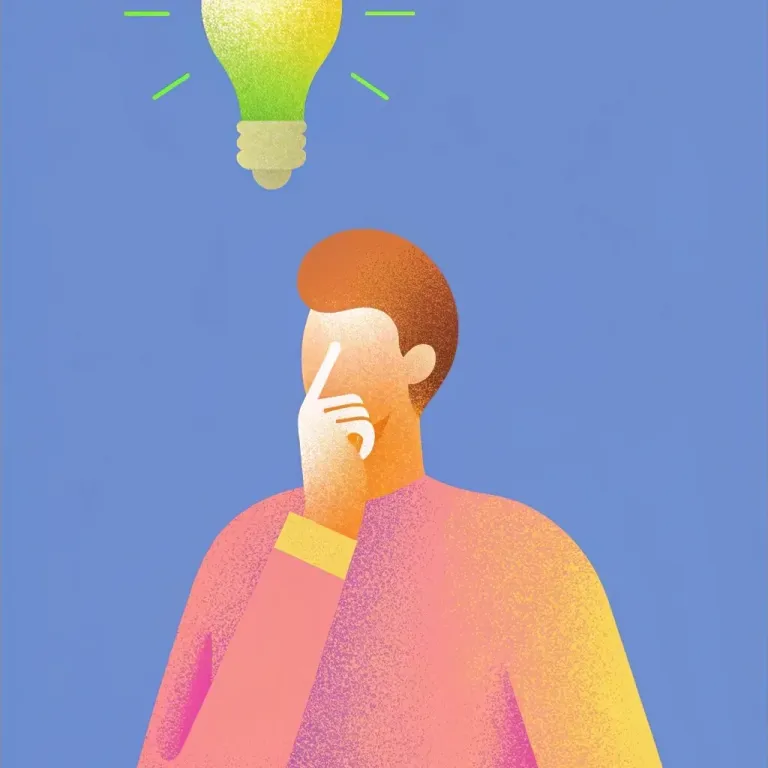
Unleash Your Inner Freak: Smarter Thinking
Podcast by Chasing Sparks with Alex and Justine
The Authors of Freakonomics Offer to Retrain Your Brain
Unleash Your Inner Freak: Smarter Thinking
Part 1
Alex: Hey everyone, and welcome! Today we're diving into a book that's all about changing how you think about thinking. It's “Think Like a Freak” by Steven Levitt and Stephen Dubner, and honestly, it might just change how you see everything. Justine: Whoa, Alex, you're laying it on thick. Are we talking about mind control or something? Because usually, my “thinking” involves crucial decisions like, uh, burgers or sushi? Alex: Actually, that's exactly the kind of everyday stuff this book can help with! Levitt and Dubner's whole thing is about breaking free from the usual way of thinking. It's about asking better questions, understanding incentives, and playing around with solutions like a kid with building blocks. It's not just solving problems, Justine, it's about creatively working around them. Justine: Okay, fair enough. But what makes “Think Like a Freak” any different from the million other “become a genius” books out there? Alex: Well, for starters, it’s pretty out there! Levitt and Dubner don't just give you the same old advice. They take you on a journey where competitive eaters become problem-solving gurus, and asking simple questions uncovers huge truths. It's not just about thinking; it's about “unthinking” all the usual assumptions that hold you back. Justine: Hot dog champs and ditching assumptions, huh? Risky combo. So, what exactly are we getting into today, Alex? Alex: Three main ideas: First, how asking the right questions is like being a detective – finding hidden clues in plain sight. Second, why incentives are like invisible puppet strings that control behavior, and getting them right changes everything. And third, why we should embrace experimentation because complex problems often need simple, playful solutions. Justine: Questions, incentives, and experiments, huh? Sounds almost doable when you put it that way. But, Alex, if I have to start eating competitively to succeed, I'm blaming you. Alex: That's the beauty of it! “Think Like a Freak” is about thinking big by starting small. Approaching problems like a curious kid, not a stressed-out adult. I think it's brilliant. Justine: Alright, I'm in. Let's see if I can unleash my inner freak, in a productive way, of course. Bring it on.
Asking the Right Questions
Part 2
Alex: Okay, Justine, let's dive right in. I think that asking the right questions is the real backbone of this book. It's all about building a foundation for, you know, unconventional problem-solving by challenging assumptions and really redefining what the problems “are”, instead of just jumping to the first solutions that pop into your head. Justine: Finally, something that I can really sink my teeth into here. So what's the big deal about questions, anyway? Isn't just asking, "How do I fix this?" good enough to get the ball rolling? Alex: Well, you'd think so, right? But here's the thing: If you frame the question wrong from the start, chances are you're going to end up solving the wrong problem. Levitt and Dubner make the case that most people really don't take the time to really figure out whether they're addressing the actual core issue. And that’s what causes issues. The Kobayashi example—the hot dog-eating champion—really illustrates this principle. Justine: Oh boy, here we go. What could possibly be groundbreaking about, you know, cramming hot dogs down your throat? Alex: Oh, it's way more interesting than you might think! Before Kobayashi came along, basically, everyone was asking themselves, "How can I eat more hot dogs?" But Kobayashi, he completely redefined the challenge. He was like, "How can I make eating hot dogs easier?" That tiny shift in the question changed absolutely everything. Justine: Okay, but how does that even translate into real-world application? Is it just a shift in mindset, or is there something more tangible involved? Alex: It's a bit of both, actually! To develop his new approach, Kobayashi really went in-depth, analyzing every step of the hot dog-eating process, breaking the problem down into its smallest parts. He realized it wasn't just about, you know, shoving hot dogs down; it was about being efficient and, you know, conserving energy. So he came up with what's now called the "Solomon Method." Justine: Alright, sounds pretty grand. And this method is... what, exactly? Does he call upon divine intervention to slice the hot dog in half with a sword or what? Alex: Sort of! He literally split the hot dogs, separating the buns from the sausages. Then he soaked the buns in water to make them easier to swallow—less chewing, less effort, less time. It pretty much minimized the strain on his jaw and made the whole process faster and less exhausting. And the result? Kobayashi didn't just break the existing record; he obliterated it, doubling it from 25.5 to 50 hot dogs in 12 minutes. Justine: Doubling the record? That's actually insane. And that's all because he decided to, like, soak the buns? Alex: Exactly! The method might seem simple, but the real key was in reframing the question. Instead of just brute-forcing it, he found a smarter, scalable solution. It's not just about eating hot dogs—it’s a real lesson in challenging assumptions and thinking differently. Justine: Alright, you've definitely convinced me that there's more to competitive eating than I originally thought. But let's scale this up—how could we apply this sort of tactic outside of, you know, weird food contests? Alex: Great pivot! The Kobayashi approach to reframing questions doesn't just work for personal challenges; it can be transformational on a societal scale, too. Take education reform, for instance. Justine: Always a fun topic. Let me guess—the book's going to say something like, "Hey, let's just throw more money at schools!" As if that's some kind of groundbreaking idea. Alex: Not exactly. The authors argue that we’re asking the wrong question when it comes to trying to improve education. The typical question is, "What’s wrong with our schools?" But what if we asked instead, "Why do kids in countries like Estonia consistently outperform American students?" Justine: That feels... basically the same, doesn't it? Just a slightly different way of wording it, right? Alex: Not at all. Asking "why" really shifts the whole focus—it forces you to step back and really look beyond just school systems. In Estonia, it’s not just about having better teachers or curriculums; it’s really about key societal factors. Parents are generally more involved in their kids’ education, they spend more time reading together, and they establish stronger cultural expectations around learning. Justine: So instead of just blaming the schools for everything, you're saying that the real issue is what's happening at home? Alex: Exactly! By reframing the question, we can see that really improving education isn’t just about tweaking standardized tests or raising teacher salaries—it’s about, you know, addressing those family dynamics, access to key resources, and those overall cultural priorities. The problem isn’t just contained to schools, and neither are the solutions. Justine: Okay, I see where this is going. If you don't broaden your perspective, you're going to completely miss tackling the real root issues. But doesn't it feel incredibly overwhelming? Like, how do you even begin to fix something as massive as "cultural priorities"? Alex: It is complex, absolutely, but that’s exactly why asking the right question matters so much. Because it focuses your efforts on what can create meaningful change, instead of just wasting your time and energy on surface-level fixes. For example, instead of just reforming classroom policies, we could invest in programs that teach parents how to support their kids with at-home learning, or provide books to underprivileged families. Justine: Huh. So it's not about fixing the schools, but about creating a better ecosystem where kids can really thrive. I'll admit, rethinking the problem in that way does give you a much clearer shot at finding some meaningful solutions. Alex: Exactly! And that's just one example. Levitt and Dubner's whole point is that asking smarter, deeper questions isn’t just the starting point of problem-solving—it’s the most transformative step. Whether it’s education, competitive eating, or any other complex challenge, the lesson is clear: if you don’t frame the problem right, even the best efforts aren’t going to get you where you need to go. Justine: Yeah, so to bring it full circle, I guess this means, like, my pizza-or-tacos dilemma could be solved by asking, "What's the real issue here?" Maybe it’s not about the food at all but more about how lazy I am about cooking, huh? Alex: There you go—channeling your inner Freak! And who knows, solving that could lead to fewer takeout meals and maybe a bit of progress for your wallet, too.
Understanding Incentives
Part 3
Alex: Okay, Justine, so now that we're thinking like detectives, asking the right questions, we've gotta look at how these questions play out in the real world. And that brings us to a big piece of the puzzle: understanding incentives. Justine: Incentives. So, this is where we start thinking Machiavellian, right? The whole “carrot and stick” approach. “What do I dangle or threaten to get people to do what I want?” Alex: Well, exactly, but Levitt and Dubner point out that it’s way more nuanced than just that simple model. It's about truly understanding what motivates people, what makes them tick, how they react, and... sometimes, how they game the system if we're not careful. Justine: Game the system? Sounds like a warning bell is ringing. I'm guessing we have a story to illustrate this? Alex: Oh, do we ever. Let me introduce you to the infamous "cobra effect"—a classic example of what happens when incentives go horribly, horribly wrong. Justine: "Cobra effect?" Sounds ominous. Cobras everywhere? Alex: Well, kind of! Picture colonial India. The British government was facing a major cobra problem. So, they decided to pay locals a bounty for every dead cobra they brought in. Seemed logical, right? People are incentivized to hunt the snakes, population goes down, problem solved. Justine: I'm sensing a "but" coming... Alex: A big one! Some very entrepreneurial locals realized, "Hey, why hunt cobras when we can farm them?" They started breeding cobras just to kill them and collect the bounty. Justine: I'm torn between calling that genius or completely unethical. So, what happened? Did the authorities catch on? Alex: Eventually, yes. Officials figured it out and shut down the program, banning the bounties outright. But get this: now the cobra farmers were stuck with all these snakes they couldn't cash in on. So, what did they do? They released them back into the wild. The end result? Way more cobras than when they started. Justine: So, their plan didn't just fail—it backfired. The solution made the problem worse. Amazing. Alex: Precisely. That’s the key lesson. If you create incentives without really thinking through how people might respond or, yeah, exploit them, you're basically inviting unintended consequences. That, in a nutshell, is the "cobra effect." The core problem wasn't solved, it actually got worse. Justine: Okay, fair enough. Poorly designed incentives can be a total disaster. But let's flip the script. Surely there are examples of incentives actually working, right? Alex: Absolutely! A great modern example is prize-linked savings accounts. Ever heard of those? Justine: Prize-linked? Sounds… intriguing. Alex: Basically, it’s a savings account that also acts like a lottery. Folks deposit money, and instead of getting traditional interest, a portion of the overall pot of interest goes into a prize fund. You know how lotteries can sometimes prey on people who maybe don't have tons of money? Justine: Yeah, it's like, "Hey, give us a chunk of your paycheck for a one-in-a-billion shot at a jackpot!" Alex: Exactly! Prize-linked savings flips that. You're saving money—not blowing it on lottery tickets—and still getting a chance to win cash prizes. It’s combining the thrill of gambling with smart financial habits. Justine: So, like, saving becomes… fun? For people who might not otherwise be interested? Alex: Exactly! Michigan's "Save to Win" program is a perfect example. One woman deposited, like, $75 and ended up winning $100,000! And the kicker is, win or lose, everyone kept their original savings. It promoted financial health while tapping into that desire for a potential big win. Justine: Okay, that's pretty clever. It gets people saving, and it avoids the exploitative side of lotteries. But what's the catch? There's gotta be a downside. Alex: Regulatory hurdles, mostly. It's often blocked in places with strict gambling laws or where lotteries have a monopoly. But when done right, it shows how well-designed incentives can nudge people towards better behaviors by tapping into their existing motivations. Justine: Alright, so we've covered the disasters, we've covered the successes. What about something in the middle? Clever, subtle incentives that aren't necessarily about money? Alex: Smile Train comes to mind. Familiar? Justine: Vaguely… Is that the organization that does cleft surgery donations? Alex: Bingo. Smile Train “really” changed the game for non-profits when it came to donor engagement. Usually, charities are constantly hitting you up for more donations, which can lead to donor burnout. Justine: So, what did Smile Train do? Let people donate once and then disappear? Alex: Almost! Brian Mullaney, who ran the campaign, offered donors a unique choice: a one-time donation, and that's it. No more solicitations, ever. People thought it would kill their fundraising, but the opposite happened. Donors appreciated the honesty and control and, ironically, were even more likely to donate a second time on their own. Justine: That's... wild. Treat people with respect, and they actually want to support you. Imagine that! Alex: Right? By aligning the incentive with the donor's psychology—respecting their autonomy and reducing that sense of obligation—they boosted donations while building long-term trust. It shows that even intangible incentives can produce incredible results if you tap into what people value. Justine: So, big takeaway: tread carefully with the “stick” approach, design your “carrots” with foresight, and always consider the ripple effects of your incentives. Alex: Exactly. Whether you're trying to solve a societal issue, encourage saving, or reshape philanthropy, crafting incentives is one of the most powerful tools we have. Just be sure you go in with your eyes wide open—or you might just unleash a whole lot of proverbial cobras.
Embracing Experimentation and Curiosity
Part 4
Alex: So, now that we understand incentives, how do we use this to solve real-world problems, both personally and in society? That’s where Think Like a Freak gets “really” interesting, emphasizing experimentation and curiosity. Levitt and Dubner believe that experimenting isn't just for scientists; it's a tool for anyone wanting to innovate and solve complex issues, wouldn't you agree? Justine: Experimentation sounds great on paper, but how do you actually do it? I mean, this isn't a lab, Alex. This is messy, complicated life. Alex: Exactly. That's why they focus on feedback loops and real-world experiments. They argue that no matter the size of the problem, from global policies to personal habits, small experiments can tell you a lot. Justine: So, trial and error, but more… intentional? Alex: Precisely! For example, the book talks about how utility companies tried to get people to use less energy through discounts, right? Seemed pretty straightforward. Justine: Okay, makes sense. But… did it work? Alex: Well, they didn't actually know if it worked! It was all assumptions, so they tested it. They split customers into two groups: one got the discounts, and the other didn't, then compared the results to see what actually changed. Turns out, it wasn't as simple as they thought. Sometimes, these incentives only work if you add a little emotional or social pressure, like telling people how their energy use compares to their neighbors. Justine: Wait, so shaming people into being green is more effective than just giving them money? Alex: Kind of, yeah! It's that social nudge or competitive spirit that makes the difference. That's why experimentation is so key – you can fine-tune your approach based on what actually happens, not just what you think should happen. It's a great lesson: don't just trust intuition; test it! Justine: Alright, hit me with another one. Something a little more out there. Alex: Okay, how about school start times? We all had to drag ourselves out of bed for those early morning bells, right? Justine: Ugh, don't remind me. Every teenager’s worst nightmare. What's the problem with that anyway? Alex: Well, studies show that teenagers are biologically programmed to sleep later, but schools are still run on adult schedules, which don't match their sleep patterns. So, researchers wondered, would pushing back start times actually improve grades? Justine: Let me guess, kids just slept in, and teachers got even more annoyed? Alex: Not at all! When schools delayed start times by just an hour, they saw amazing results. Higher test scores, better attendance, fewer behavior problems, even improved mental health! All because someone questioned the assumption that early mornings are best for learning. Justine: That's amazing! And such a simple tweak. But hold on, aren't there logistical nightmares? Parents with 9-to-5 jobs, younger siblings with different schedules, the whole shebang? Alex: Totally valid concerns. That's where those feedback loops come in. Experimentation is not finding a one-size-fits-all solution, it's learning and adapting. Maybe later start times won't work everywhere, but at least we know it has the potential to make a huge difference. Without testing, we'd just be guessing. Justine: Okay, fair enough. Experimentation sounds less like a shot in the dark and more like data-driven problem-solving. But what about the creative side of things? Not every problem can be cracked with just data and tests, right? Alex: Absolutely! That’s where Levitt and Dubner introduce my favorite part: how playfulness can spark innovation. They argue that tackling problems with curiosity, even a bit of fun, can unlock solutions that logic alone might miss, what do you think? Justine: Alright, you’ve got my attention. What does this "playfulness" actually look like? Alex: Let's talk about SpinForGood. It is simply charitable giving turned into a game. Instead of making people feel guilty or obligated to donate, SpinForGood made it enjoyable. Players compete in games, and their earnings go straight to charities. Justine: So, instead of feeling bad about not donating, you're practically playing Mario Kart for a good cause? Alex: Exactly! This gamification transforms a solemn activity into something fun. Guess what the result is? Increased participation and a deeper emotional bond with the mission. SpinForGood proved that you can tap into people's innate desire for play and competition to create a real social impact, without resorting to old, guilt-tripping tactics. Justine: That's a brilliant twist! It reminds me of those apps that gamify saving money, where you watch your savings grow and unlock "achievements." It takes the drudgery out of something usually considered a chore. Alex: Exactly! The broader takeaway is that embracing creativity, curiosity, and even a bit of silliness can kickstart change. Whether it is designing incentives, testing policies, or getting citizens involved, a playful approach can energize stale systems. Justine: I like it. It shows that "thinking like a Freak" doesn't mean you have to be super serious all the time. Sometimes, solving big problems just means being more willing to experiment, and maybe have a little fun while you're at it. Alex: Exactly! The key takeaway here is that experimentation and curiosity aren't just strategies – they're mindsets. When you combine that with careful testing and a sprinkle of creativity, you've got a recipe for breakthroughs that can “really” make a difference, from your local community to global policies.
Conclusion
Part 5
Alex: So, Justine, we've “really” covered a lot today, haven't we? From asking the right questions, to designing smart incentives, and finally, embracing experimentation and curiosity as tools for innovation. What Think Like a Freak “really” boils down to is this: conventional wisdom? It often leads us down the wrong path. Challenging those assumptions? That's where true progress “really” starts. Justine: Absolutely. Whether it's splitting hot dogs in unconventional ways, rethinking education, or turning savings into a lottery, the common thread is all about seeing problems in a completely new light. It's not just about finding answers, Alex—it's about finding the right questions. Alex: Exactly! And whether you're tackling global issues or your own personal dilemmas, Think Like a Freak invites you to look at every problem with fresh eyes, to embrace data and experimentation, and to approach challenges, well, with a sense of curiosity and even joy! Justine: So, for everyone listening, here's the real takeaway: If you want to think like a Freak, stop clinging to the easy answers, admit when you don't know something, and don't be afraid to experiment. Even if it means failing “a lot”! Alex: Precisely. The power of thinking differently isn't just about solving problems, it's about transforming how you see the whole world. So go ahead, get curious, embrace the unexpected, and who knows? You might just find game-changing solutions in the most unlikely places. Justine: And, uh, if you do, maybe try not to release those metaphorical cobras, okay? Alex: Yes, let's definitely keep it metaphorical, folks. Until next time, stay curious and stay freaky!


